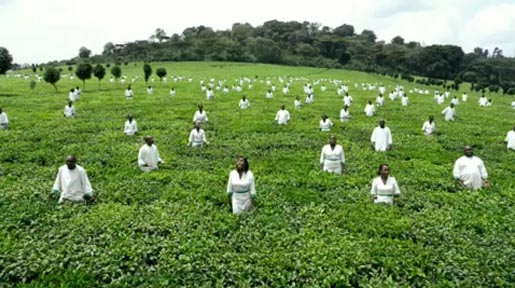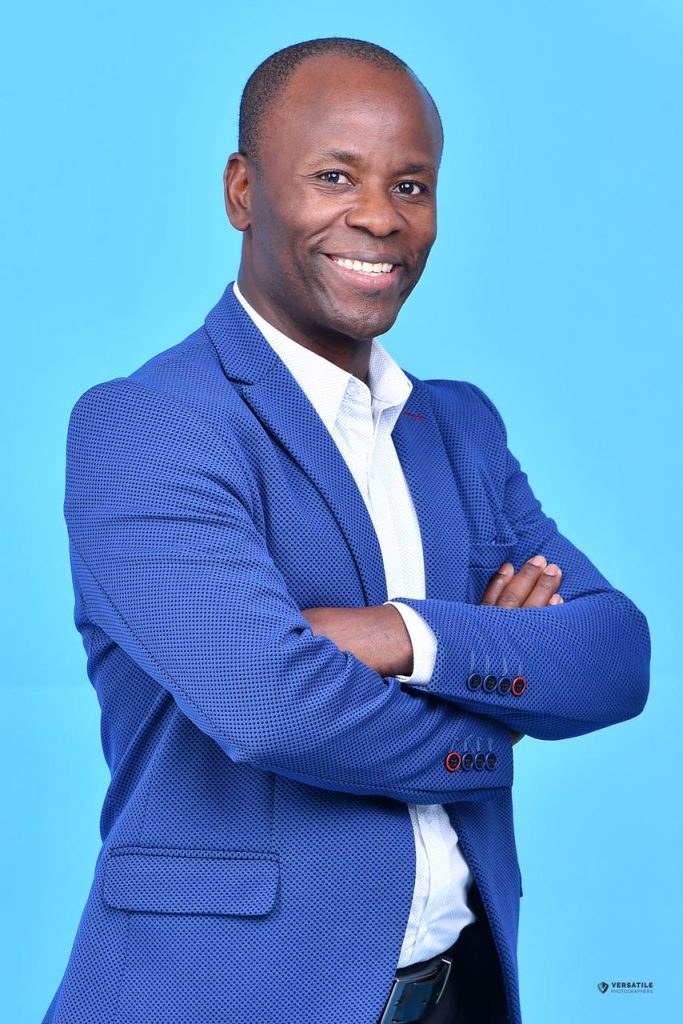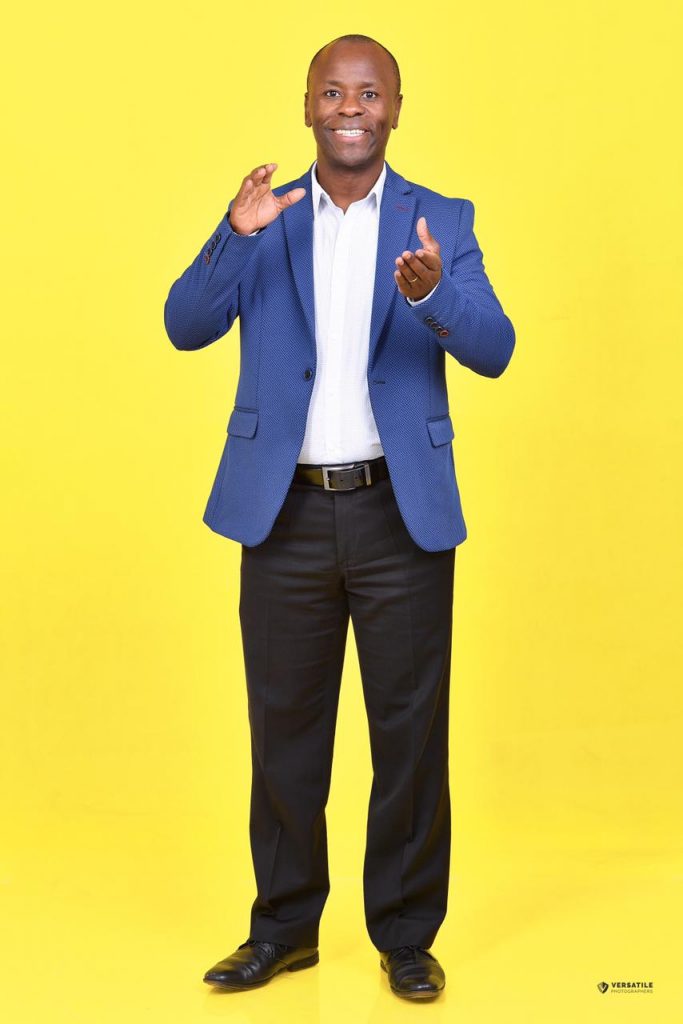
11 years ago, Safaricom gave us Niko na Safaricom ad that still gives me (us) cheers down my (our) spine. The almost 2-minute song not only gave us a tune that showed us the exemplary beauty of the country – I mean, they really showed us how many places in Kenya we hadn’t explored – but also reminded us who we were and still are.
Looking back at that ad, I wondered what went through the minds of the people involved; and while that list can be long – I was able to talk to the composer, Gabriel Omondi and the Safaricom choir director, Ken Wakia to try and figure out their thought process through the one-and-a-half-minute song.

Gabriel Omondi
Gabriel is a music composer who helped compose the most talked-about advert, the Niko Na Safaricom in 2010.
Tell us what you do and how long have you been in the music industry.
I am a music composer, pianist, music producer, and sound engineer. I started taking music classes way back while in primary school then started performing music from there. I started with being a pianist. I’d play piano and keyboard, and that’s how I found my way into music production. Whilst in music production, I started with being a studio assistant, working my way slowly to becoming a music composer.
Music means a lot of things to a lot of different people. What are some of the most memorable moments that blew you away as an artist?
That’s a big question (Chuckles). Definitely, I’ve got many of them, so lemme try compressing them into a couple of sentences. There are memorable projects like the Niko Na Safaricom, which was one of my most interesting.
Speaking of Niko Na Safaricom, it’s one of the most talked-about ads up until this date. An ad that when you listen to it, brings out that magical feeling about being a Kenyan. How was it for you?
It’s funny because it is a simple song when you think about it. I mean, music is interesting. It is almost like a lullaby or one of those folktale songs. It has got this sort of innocence, and simplicity that gets to everyone. It’s a kind of song that also allows one to float along with the song simply. The power comes from the honesty about it. I call it “the Lion King effect” simply because there is not so much like it out there therefore when you hear, and it gets straight to the heart.
While at the briefings, we were required to come up with something with a coral feeling with an old Kenyan touch. They wanted something similar to Muungano National Choir – a song that would give people goosebumps and bring a wow effect at the end.
At first, I thought this whole thing wouldn’t work because generally, such ideas are very hard to get with a choir or a coral and to get it you have to be really careful and smart on how you do it. Again, it is very tricky when you look at chorals, especially with the time frame of one and a half minutes. We were also to give it a commercial edge that captures everyone since we were doing a commercial at the back of all this.
The idea required me to go back to nothingness. To leave every other thing behind so, I didn’t have many distractions. It was like having a blank piece of paper, so it was a bit easy to build on this because there were no competing interests. The objective was for the project not to necessarily sound so much Western; it was to have that African touch, and I think honesty gave it that power because it was raw and real.
Another thing was to find the perfect voices for the mood of the project.
At first, it was an issue because we had this specific voice that we wanted. There are certain sounds that when you listen to, you automatically know that it’s African and that’s what we were looking for. We thank God that we got it right and it’s there to stay.
Did you think that the song would have such an impact considering it was 2010 and this is 2021, and it’s still a commercial that is still being talked about?
No. I didn’t have that thought in my head. Most of the time, you don’t even know your potential until someone else tells you, so no, I didn’t.
However, I was excited when I finished the song.
I knew it was quite something especially when I presented and I’d see reactions. Some people weren’t into it. The point is, there is a war in these things, so you have to be very strong-minded almost like you are fighting for it. You have to believe in it yourself so that you can fight for and defend it.
Ken Wakia
Ken Wakia has been the choirmaster of the famous Safaricom choir for over ten years now. He has taken part in all the projects that the Safaricom Choir has undertaken including the Niko Na Safaricom advert in 2010.
Please tell me what you do and how long you’ve been in this profession?
I am the director of the Safaricom choir and I’m in this profession because, honestly, I love every minute of it.
My story dates back to when I was in primary school at Mumias Complex when my then teacher Mr. Lameck Litieka – the deputy headmaster, when the music festival was around the corner, would make us sing the national anthem then randomly picks a few of us to join the school choir.
By then, I was in class six and choir was the last thing in my mind since I was really into football and I’d find every opportunity not to join the school choir. The sad bit was that choir practice, and football training were held simultaneously, so it used to eat me up real good. Now since Mr. Lameck knew me, I had no option but to attend the choir practice. I’d make sure I stay at the front so that he would easily notice my presence. We would then practice for a few minutes before going under the desk and leaving for the field. However, since I was the shortest, Mr. Lameck would notice, and the next day he would summon me to his office for a few strokes.
Despite the beating, I would repeat the same thing, and it became a cycle. After some time, I decided to fully attend the choir practice since I was tired of the canning almost every morning. What made me appreciate being in a choir was that we would be taken out of school on several occasions to perform.
Fast forward, I finished primary school and joined Musinga High School. I voluntarily joined the choir and chose music. I did my best that the music teacher identified me. He would then be calling me up to train for particular voices and set pieces.
In summary, I took more interest in music, took music as a lesson, and even became the music club chairman. I took music even more seriously than I was called to Kenyatta University to study Bachelor of Education, Music. At K.U, I was part of the University Choir Committee and trained the university choir- the Kenyatta University Chamber Choir.
I joined the University of Miami for my Master’s Degree in Choral Conducting, came back, and taught at Africa Nazarene University until 2008 when I moved to the U.S. Embassy to manage cultural exchange programs. I’m confident when I say that I’ve been in this field for many years.
How did you find yourself with Safaricom specifically the Safaricom Choir?
When I came back from the United States in 2005, I formed a choir called the Nairobi Chamber Chorus. In 2006, we started pro bono singing at events around Nairobi.
In 2007 we were singing at Westgate Mall, and a short white man stopped by, listened, and presumably liked whatever we were performing. After the performance, the short white man, Mr. Michael Joseph, the then Safaricom CEO, wanted to see me in his office as he wanted Safaricom to have its own choir.
We went to see him in his office, and he said he wanted to start a Safaricom Choir with a minimum of 200 people who would solely come from Safaricom employees. That meant we had to listen to every voice of all interested employees.
Fast forward, and the audition date was set. Out of the 200 choir members needed, only 75 showed up. Worst of it all, I couldn’t find anyone who could carry a tune. In short, they were not good. Of the 75, only 4 or 5 that I’d say they were right.
As a result, I booked another appointment with Michael and told him that the whole choir thing was not going to work since I couldn’t find any of the employees who could make a good choir a per his ambitions. Michael was not the kind of person to say no so I did what I had to do to get a yes.
I called for another audition. We invited around 130 people to join the choir, and that’s how we started. Besides the singers, I needed a system and a group of assistance since I couldn’t solely manage 130 people. Micheal allowed me to bring in 5 mentors, one in each voice. These mentors would help me improve the general performance of the choir.
In 2010, you guys came up with the Niko Na Safaricom Song, one of Kenya’s most incredible ads. Did you think that this song would be this big?
Honestly, I didn’t think it would be that big. However, when I saw the energy behind it and the commitment that Michael Joseph had for it and knowing him a little more, I knew he was up to something great. He is a big thinker who wants great things to happen. It was also the first advert that I was mainly involved in considering the choir was just two years old, so I didn’t expect much.
Generally, in Kenya, judging from the Safari Ya Wasanii video just recently launched, artists consider that music is hard to do in this industry from music production to marketing etc. How is it for someone like you? Considering yours is a different ball game especially before you joined Safaricom.
It is tough. Being in the music industry is challenging for you to breakthrough. That’s the reason why I still practice. For me, music is my love, and I consider myself a musician first. The choral music industry is way worse. It is nearly impossible to break through and make ends meet with the choral music.
Music such as Pop, just by their name, has a chance for artists to hang in there because many people love it, but it isn’t easy in Coral and Classical music. Coral kind of music is considered elitist, so not so many people appreciate that industry. People love quality in every part of life, and if you give out quality, you will have an audience. That has always been my philosophy that I’ll strive for quality in everything I do in choral music.
I also try and find my space and try not to be like someone else which is the biggest problem most artists do.
Music has vast space, so as an artist, you need to find which corner is yours.
How has your experience been while working with Safaricom?
It’s been great. I’ve been leading the Safaricom Choir for ten years now, and I can attest that the Safaricom choir is the best corporate choir in this country. I’m not just bragging about that. I am a member of the International Federation for Choral Music, and I can tell you for a fact that Safaricom competes very favorably with their type of choirs around the world.
However, it has not been easy, and I thank the management of Safaricom Choir, particularly Michael Joseph, for having the vision and allowing employees to express themselves as music is a form of expression.
I also want to thank the late Bob Collymore and Peter Ndegwa for retaining the vision. One thing I should tell you is that choirs are expensive to maintain. We are looking at expenses ranging from transport, accommodation, etc. Despite that, Safaricom has managed to provide all that is required by the choir. Special thanks to Safaricom’s Marketing Officer Miss Zaheeda Suleiman since the choir is under her office. I also, in a special way, owe a lot to the singers in the choir. Those people are the tools that I work with, and without them, the choir wouldn’t exist.




















